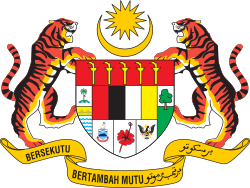This article needs additional citations for verification .(October 2023) |
| National Language Act 1963/67 | |
|---|---|
 | |
| Parliament of Malaysia | |
| |
| Citation | Act 32 |
| Territorial extent | Throughout Malaysia, except Sarawak |
| Passed by | Dewan Rakyat |
| Passed | 11 March 1963 |
| Enacted | 1963 (Act No. 10 of 1963); and 1967 (Act No. 7 of 1967) Consolidated and revised: 1971 (Act 32 w.e.f. 1 July 1971) |
| Passed by | Dewan Negara |
| Passed | 15 March 1963 |
| Effective | Peninsular Malaysia–sections 9 to 11–11 April 1963, Act 10 of 1963; Remainder–1 September 1967, Act 7 of 1967 |
| Legislative history | |
| First chamber: Dewan Rakyat | |
| Bill title | National Language Bill 1963 |
| Introduced by | Abdul Razak Hussein, Deputy Prime Minister |
| First reading | 28 November 1962 |
| Second reading | 11 March 1963 |
| Third reading | 11 March 1963 |
| Second chamber: Dewan Negara | |
| Bill title | National Language Bill 1963 |
| Member(s) in charge | Mohamed Ismail Mohamed Yusof, Assistant Minister of Information and Broadcasting |
| First reading | 15 March 1963 |
| Second reading | 15 March 1963 |
| Third reading | 15 March 1963 |
| Amended by | |
| National Language (Amendment and Extension) Act 1983 [Act A554] National Language (Amendment) Act 1990 [Act A765] Constitution (Amendment) Act 1994 [Act A885] National Language (Amendment) Act 1994 [Act A901] | |
| Related legislation | |
| National Language (Application) Enactment 1973 [En. No. 7/1973] | |
| Keywords | |
| National language | |
| Status: In force | |
The National Language Act 1963/67 (Malay : Akta Bahasa Kebangsaan 1963/67), is a Malaysian law enacted to consolidate the law relating to the use of the national language, as promised by the preceding Malayan government to be done 10 years after its independence. [1]